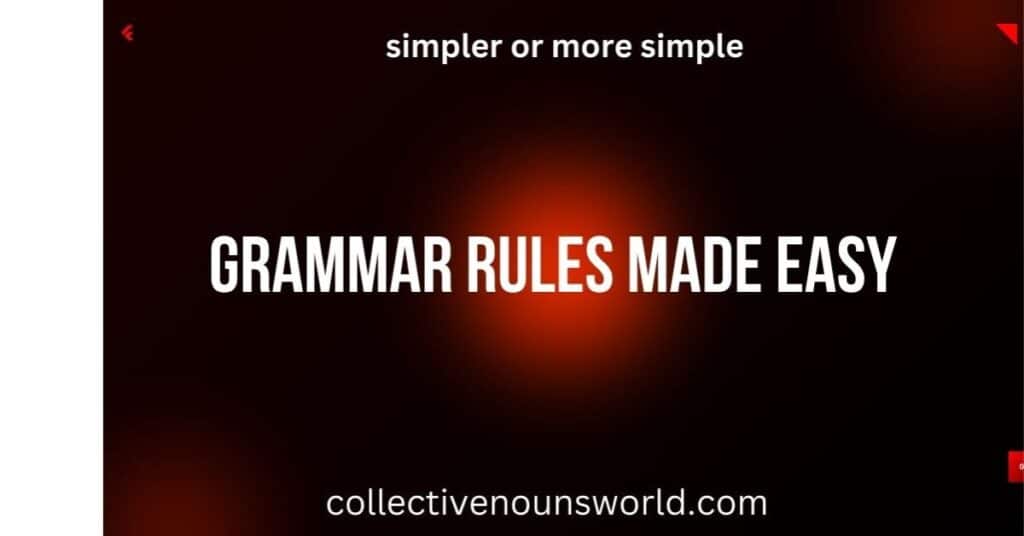When you write or speak in English, you might come across the terms “simpler” and “more simple.” Both refer to something being easy or not complicated. But which one is the right choice?
In this article, we’ll explore both terms in detail, explain when to use each, and help you understand their correct usage in different situations. We will also cover grammar rules and show how simpler and more simple fit into the comparative adjectives framework.
Whether you’re a student, writer, or just someone wanting to improve your grammar, this guide will help you make sense of simpler vs. more simple and help you decide which is best for your writing style.
Understanding “Simpler” and “More Simple”
To start, let’s look at the meaning of the two terms. Both “simpler” and “more simple” describe something that is easy or uncomplicated. But why do we have two forms to express the same idea?
Simpler is the correct comparative form of simple when you follow English grammar rules. It’s used when comparing two things and showing that one is less complicated than the other. For example, “This explanation is simpler than that one.”
On the other hand, “more simple” also means easy but isn’t as commonly used in modern English. Some people still use it, but it’s considered incorrect by most grammarians because it doesn’t follow the syllables rule for forming comparative adjectives. In English, you usually don’t need the word “more” with two-syllable adjectives or shorter adjectives like simple. Instead, you just add “-er” to form the comparative, making “simpler” the more natural choice.
You may also like: Potatoes or Potatos: Which One Is Right?
The Grammar Behind “Simpler” and “More Simple”
In English, when we make comparative statements, we generally follow certain rules. The basic rule for comparative adjectives is simple:
- For one-syllable adjectives, you add -er (e.g., smarter, bigger).
- For two-syllable adjectives, you either add -er or use “more” to make the comparison (simpler vs. more simple).
- For three-syllable adjectives and longer, we use “more” (e.g., more beautiful).
The word simple has two syllables, which means it can technically follow both patterns. You can say “simpler” or “more simple.” However, simpler is preferred because it fits the typical pattern for two-syllable adjectives. Using “more” with simple is a bit redundant, which is why it is generally avoided in most grammar guides.
Why Both Are Acceptable Options
Though simpler is the more common choice in formal English, more simple is still acceptable. Why? Because English is flexible, and language evolves over time. In the past, more simple was often used, especially in older English texts. It was a way of emphasizing simplicity in a more detailed way. However, with time, the simpler form, simpler, has become the norm.
This means that both simpler and more simple are correct in certain contexts. You’ll see both forms used in spoken and written language, especially in informal settings. For example, someone might say, “This way is more simple,” for emphasis, even though the grammatically “correct” form would be simpler.
Choosing the Right Option
When deciding whether to use simpler or more simple, context plays a crucial role. If you’re writing in a formal setting, you should stick with simpler. Academic writing, business reports, or official documents usually favor simpler because it follows the accepted grammar rules.
In informal writing or spoken language, though, you might hear both. For example, in casual conversation, someone might say, “That’s more simple than it sounds.” This isn’t wrong, but it is less formal. If you’re writing a casual blog post or an email to a friend, more simple could work just fine.
Common Missteps to Avoid
It’s easy to make mistakes when deciding between simpler and more simple, especially since both forms can seem correct. One of the biggest mistakes people make is using more with a word that doesn’t require it. Remember, two-syllable adjectives like simple should usually take -er to form the comparative: simpler.
Another error is using simpler when more simple is appropriate for emphasis. In these cases, choosing more simple can make your writing sound clearer and more natural. Understanding when to use each form is key to mastering these comparative adjective comparisons.
Practice Makes Perfect
To help you improve your understanding of simpler and more simple, let’s look at some examples. Here are a few sentences that demonstrate how to use each term.
- “This explanation is simpler than the previous one.”
- “The process could be more simple if we break it down further.”
- “A simpler solution is always better.”
- “Can you make this more simple for me to understand?”
You may also like: IHH Meaning in Text: Simple Guide & Examples
Side-by-Side Comparison
Now, let’s break down the differences between simpler and more simple to make it clearer.
| Term | Correct Usage | Why It’s Used |
| Simpler | More common, grammatically correct | Follows the standard rule for comparative adjectives |
| More simple | Acceptable in informal settings | Emphasizes simplicity but doesn’t fit the syllables rule |
In formal contexts, simpler is preferred because it follows the grammatical structure of comparative forms of adjectives. More simple, however, might be used when someone wants to add emphasis or make the sentence feel more natural in casual speech.
Everyday Language Use
When it comes to natural language usage, both simpler and more simple are commonly used in everyday conversation. You’ll often hear people say, “This way is more simple,” especially when they want to sound informal or emphasize the ease of something. In written English, simpler is generally more accepted, especially in more formal writing like essays, reports, or business emails.
However, in online communication or social media, the choice between simpler and more simple isn’t as strict. People tend to focus on sentence clarity and how natural the sentence sounds rather than strictly following grammar rules.
The Difference Between “Simpler” and “More Simply”
It’s important to note that simpler and more simply are different parts of speech. Simpler is an adjective, while more simply is an adverb. Simpler describes a noun, while more simply describes a verb. For example:
- Simpler: “This is the simpler solution.”
- More simply: “We can explain it more simply.”
What Is the Definition of “Simpler” and “More Simply”?
Both simpler and more simply describe something that is not complicated. Simpler refers to a comparison between two things, showing which one is easier or less complex. More simply, on the other hand, refers to the way something is done, describing the simplest form of an action.
Which Is the More Popular Variant on the Internet?
According to search trends, simpler is more commonly used in the U.S. However, more simple still appears frequently in blogs, social media posts, and informal settings. This reflects the influence of casual, conversational writing styles that prioritize concise expressions.
Why People Still Use “More Simple”
Even though simpler is preferred, more simple has a long history of use. Some writers still choose it for stylistic reasons, such as to make a sentence sound more balanced or rhythmic. It’s also used when someone wants to emphasize the ease or clarity of something.
You may also like: Top 20 Jamaican Slang for Friend or Bro
Simpler or More Simple: A Guide to Clear Communication
Ultimately, the choice between simpler and more simple comes down to the tone and context of your writing. When you want your writing to sound clear and concise, stick with simpler. But in informal writing, more simple can work just as well to make your point.
Grammar Myths: Debunking “Simpler” vs. “More Simple”
One common myth is that more simple is wrong. This isn’t true. Both forms are acceptable, but simpler is typically the safer choice, especially for formal writing. However, there’s no need to stress about it. As long as you are consistent in your usage, both options can work.
You may also like: Anual or Annual: Which One’s Right? Correct Spelling Explained
Simpler or More Simple: Choosing the Right Phrase for Your Context
In summary, the choice between simpler and more simple depends on the setting. For formal writing, always choose simpler. For informal settings, more simple can be used to create a more relaxed, conversational tone.
Understanding the grammar rules for these terms and their contexts will help you choose the right phrase for your next piece of writing. Keep practicing, and over time, selecting the appropriate form will become second nature.
FAQs
Is “simpler” or “more simple” correct in English?
Both are correct; “simpler” is more commonly used, while “more simple” is valid but less frequent.
Can “more simple” be used in professional writing?
Yes, “more simple” can be used, especially for emphasis or clarity, though “simpler” is usually preferred.
How can I decide between using “simpler” or “more simple” in my writing?
Choose “simpler” for concise, natural writing and “more simple” for emphasis or when avoiding ambiguity.
Is “more simply” grammatically correct?
Yes, “more simply” is correct as an adverb, often used to modify verbs, e.g., “She explained it more simply.”
What is the comparative of “simple”?
The comparative of “simple” can be “simpler” or “more simple,” depending on stylistic preference.
Is it simpler or less simple?
Both are correct but convey different meanings; “simpler” indicates greater simplicity, while “less simple” suggests complexity.
Conclusion
Both “simpler” and “more simple” can be used, but “simpler” is generally preferred in formal writing. The key is understanding when to use each form based on context. For clear, concise communication, “simpler” is often the best choice, especially in professional or academic settings.
However, in casual speech or writing, “more simple” can work just as well. Keep practicing, and you’ll soon know when to use each form naturally, making your writing more effective and easier to understand.

Luna Jasper is an experienced blogger with a passion for language and grammar. At **Collective Nouns World**, she shares her expertise in exploring the fascinating world of collective nouns, making learning both engaging and fun. With years of writing and research under her belt, Luna’s insightful articles help readers understand and appreciate the English language.







